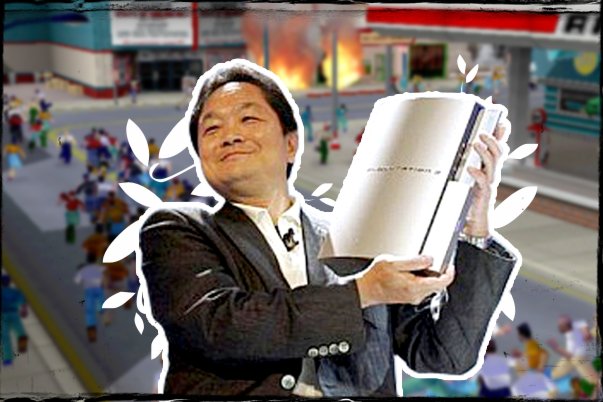The Top 7... PR disasters
We chronicle the embarrassments that the industry would rather you forgot
1. The PlayStation 3 launch
How do you take one of the most anticipated game consoles of all time and - within the space of a year - turn it into a hate object reviled by the entire internet? If you're Sony, you do it by slowly eroding the goodwill of your customers with a management attitude that reeks of detached, ivory-tower arrogance.
Granted, this doesn't have the chilling scope of something like Hot Coffee, but good public relations couldn't have solved that problem. This one, on the other hand, was almost entirely created by bad PR efforts, most of them coming straight from management. For example, Sony's response to complaints about the $600 price tag? "It's probably too cheap," as Sony Computer Entertainment chief Ken Kutaragi said in a May 2006 interview. "As with the PS and PS2, we believe people who like games will, without question, purchase it," Kutaragi said.
Nobody likes to be taken for granted, and many interpreted Kutaragi's comments to mean that Sony expected - even demanded - that gamers would mindlessly line up and swallow whatever the company deigned to give them. The perception was reinforced nearly every time Kutaragi opened his mouth, and for a while there the man was a walking PR disaster unto himself.
1. The PlayStation 3 launch
How do you take one of the most anticipated game consoles of all time and - within the space of a year - turn it into a hate object reviled by the entire internet? If you're Sony, you do it by slowly eroding the goodwill of your customers with a management attitude that reeks of detached, ivory-tower arrogance.
Granted, this doesn't have the chilling scope of something like Hot Coffee, but good public relations couldn't have solved that problem. This one, on the other hand, was almost entirely created by bad PR efforts, most of them coming straight from management. For example, Sony's response to complaints about the $600 price tag? "It's probably too cheap," as Sony Computer Entertainment chief Ken Kutaragi said in a May 2006 interview. "As with the PS and PS2, we believe people who like games will, without question, purchase it," Kutaragi said.
Sign up to the GamesRadar+ Newsletter
Weekly digests, tales from the communities you love, and more
Nobody likes to be taken for granted, and many interpreted Kutaragi's comments to mean that Sony expected - even demanded - that gamers would mindlessly line up and swallow whatever the company deigned to give them. The perception was reinforced nearly every time Kutaragi opened his mouth, and for a while there the man was a walking PR disaster unto himself.

Back in 2005, for instance, Kutaragi made his infamously weird declaration that "We want for consumers to think to themselves, 'I will work more hours to buy one.' We want people to feel that they want it, irrespective of anything else." The strangeness of his quotes reached such a fever pitch that industry blog Kotaku challenged its readers to weed out Kutaragi's real quotes from ones it had just made up, such as "The PS3 will instill discipline in our children and adults alike. Everyone will know discipline."
Yeah, everyone knew discipline, all right. The discipline of stampeding through launch lines and hoarding systems to sell on eBay. For most people, though, the prospect of "working more hours" to afford a PS3 - at either retail or inflated scalper prices - wasn't appealing, and so the launch frenzy quickly faded. Sony refused to believe it, however; in a January interview with Electronic Gaming Monthly, SCEA President Jack Tretton famously offered a $1,200 bounty on any systems found "on shelves for more than five minutes." (Famously in part because it prompted the creators of comic strip Penny Arcade to demand $13,200 after photographing 11 unbought PS3s in stores around Seattle.)
Back in the real world, however, the consoles were beginning to gather dust, and it wasn't helping sales that the PS3 didn't live up to Sony's promises. Rather than enabling anyone to "experience the 4D world," as Kutaragi vowed in 2005, it enabled those who bought it to experience a lengthy firmware download, followed by a chance to play launch titles that were mostly either awful or nearly identical to their Xbox 360 counterparts. That last bit in particular cast a few aspersions on Kutaragi's claim that the PS3 would outpace Microsoft with "revolutionary technology," leading more people to question whether the shiny black brick was actually worth the extra $200.
It's worth noting that Microsoft also offered vibration-enabled controllers, which Sony didn't consider "revolutionary" enough, going so far as to insist that consumers didn't want rumble technology at all (even though they clearly and loudly did). Even if consumers did want rumble, Sony said, adding it to their motion-sensitive Sixaxis controller would be impossible. And it remained impossible until early March, when Sony settled their patent litigation suit with vibe-tech maker Immersion - something that, up until that point, Sony had insisted wasn't a factor in its controller design.
Sony's attitude didn't improve when the Wii started eating its lunch, either. SCEA spokesman Dave Karraker went so far as to dismiss Nintendo's perpetually sold-out console as an "impulse buy" at $250, further reinforcing Sony's image as completely out of touch with what the average consumer could afford.
Things have been looking up for the PS3 ever since Sony's announcements at the Game Developers Conference, and if the European launch - a few days away as of this writing - goes well, the PS3 could see an upswing as its install base grows. For now, though, the console is just a whole lot of untapped potential strapped with a clunky interface and only a few games worth playing, so whether people will actually start buying the things en masse is anyone's guess.
Mar 19, 2007
Back in 2005, for instance, Kutaragi made his infamously weird declaration that "We want for consumers to think to themselves, 'I will work more hours to buy one.' We want people to feel that they want it, irrespective of anything else." The strangeness of his quotes reached such a fever pitch that industry blogKotaku challenged its readers to weed out Kutaragi's real quotes from ones it had just made up, such as "The PS3 will instill discipline in our children and adults alike. Everyone will know discipline."
Yeah, everyone knew discipline, all right. The discipline ofstampeding through launch linesand hoarding systems to sell on eBay. For most people, though, the prospect of "working more hours" to afford a PS3 - at either retail or inflated scalper prices - wasn't appealing, and so the launch frenzy quickly faded. Sony refused to believe it, however; in a January interview with Electronic Gaming Monthly, SCEA President Jack Tretton famously offered a $1,200 bounty on any systems found "on shelves for more than five minutes." (Famously in part because it prompted the creators of comic strip Penny Arcade to demand$13,200 after photographing 11 unbought PS3s in stores around Seattle.)
Back in the real world, however, the consoles were beginning to gather dust, and it wasn't helping sales that the PS3 didn't live up to Sony's promises. Rather than enabling anyone to "experience the 4D world," as Kutaragi vowed in 2005, it enabled those who bought it to experience a lengthy firmware download, followed by a chance to play launch titles that were mostly either awful or nearly identical to their Xbox 360 counterparts. That last bit in particular cast a few aspersions on Kutaragi's claim that the PS3 would outpace Microsoft with "revolutionary technology," leading more people to question whether the shiny black brick was actually worth the extra $200.
It's worth noting that Microsoft also offered vibration-enabled controllers, which Sony didn't consider "revolutionary" enough, going so far as to insist that consumers didn't want rumble technology at all (even though they clearly and loudly did). Even if consumers did want rumble, Sony said, adding it to their motion-sensitive Sixaxis controller would be impossible. And it remained impossible until early March, when Sony settled their patent litigation suit with vibe-tech maker Immersion - something that, up until that point, Sony had insisted wasn't a factor in its controller design.
Sony's attitude didn't improve when the Wii started eating its lunch, either. SCEA spokesman Dave Karraker went so far as to dismiss Nintendo's perpetually sold-out console as an "impulse buy" at $250, further reinforcing Sony's image as completely out of touch with what the average consumer could afford.
Things have been looking up for the PS3 ever since Sony's announcements at the Game Developers Conference, and if the European launch - a few days away as of this writing - goes well, the PS3 could see an upswing as its install base grows. For now, though, the console is just a whole lot of untapped potential strapped with a clunky interface and only a few games worth playing, so whether people will actually start buying the things en masse is anyone's guess.
Mar 19, 2007



